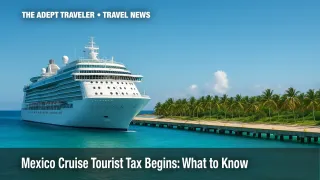Mexico Cruise Tourist Tax Begins: What to Know

Starting July 1, 2025, Mexico will collect a new Mexico cruise tourist tax-officially the Non-Resident Duty (DNR)-from every cruise passenger who sails into its ports. The fee debuts at $5 per person, but it will climb to $21 by 2027, reshaping cruise budgeting and itinerary planning. Because cruise lines will bundle the charge into existing port taxes, travelers may not spot it unless they compare invoices before and after July 1. Here's what first-time and seasoned cruisers alike should expect, plus tips for keeping vacation costs predictable.
Key Points
- The DNR starts July 1, 2025, at $5 per passenger.
- Rate rises in annual steps to $21 by 2027.
- Applies to all Mexican ports, including Cozumel and Ensenada.
- Collected by cruise lines, listed with port taxes on your invoice.
- Why it matters: fees could add $80+ to a family's seven-day sailing.
Mexico Cruise Tourist Tax Snapshot How It Works
Under the revised Federal Rights Law, cruise passengers are now treated like air travelers, who already pay a tourism tax upon arrival. The DNR is a head tax-every person on the manifest owes it, whether they disembark or stay aboard. Cruise lines remit the money directly to Mexico's treasury, so passengers will not pay ashore. Children and crew remain exempt. Revenue is earmarked for port security, environmental projects, and infrastructure upgrades in cruise hubs. The government will audit lines quarterly; non-payment risks fines or berth-allocation limits.
Mexico Cruise Tourist Tax Background Why It Matters
Mexico's Senate first approved a cruise immigration levy in December 2024, setting it at MXN 860.56 (about US $50 at today's rate). Pushback from the Cruise Lines International Association and port-side chambers of commerce led President Claudia Sheinbaum's administration to scale the opening rate down to US $5 and to phase in increases. Officials argue the measure will cut the federal deficit without trimming social programs, while funding long-delayed dredging and pier repairs. Cruise companies counter that they already pay an average US $29 in port charges at Cozumel, the world's busiest cruise stop, and that extra costs could push ships toward Jamaica or the Cayman Islands.
Mexico Cruise Tourist Tax Latest Developments
Mexico's Finance Secretariat published the implementing regulations on June 28, confirming the July 1 launch. Here is the current state of play.
Where and When the Fee Applies
All 24 cruise-capable Mexican ports fall under the rule: Caribbean staples such as Cozumel and Costa Maya, Pacific favorites like Cabo San Lucas, and Baja gateway Ensenada. The DNR triggers on each port call, meaning a seven-night itinerary with three Mexican stops will incur the charge three times per guest. Cruise lines must show the fee in pre-departure invoices issued on or after July 1.
Cruise Line Responses
Royal Caribbean, Carnival, and Norwegian have updated booking engines to insert a "Mexican Non-Resident Duty" line item. Royal Caribbean's finance chief told analysts the initial impact is "immaterial," yet the company continues negotiations to cap the 2027 ceiling at US $15. Carnival confirmed it will not absorb the cost, advising travel advisors to refresh client quotes. Smaller expedition operators that home-port in La Paz expect to include the tax in bundled fares to avoid mid-cruise collections.
Impact on Port Communities
Mahahual's Perfect Day Mexico-Royal Caribbean's planned US $292 million private resort-has stirred local unease that visitors will spend inside turnstiles rather than in town. By taxing every passenger, officials hope to capture revenue even when travelers remain on private beaches. Municipal leaders in Cozumel say 10 percent of DNR proceeds will route directly to island projects such as pier lighting and reef protection, but details await secondary legislation.
Analysis
For cruisers, the new cruise passenger fee adds another line to the budget spreadsheet but should not be a deal-breaker. A family of four on a typical Western Caribbean voyage with two Mexican stops will pay an extra US $40 this year-less than many specialty-restaurant surcharges. The real pinch comes after 2027, when that same family could see US $168 tacked on. Booking early, locking in "tax-inclusive" promotions, and comparing itineraries that substitute Belize or Roatán can offset the increase. Solo travelers on value lines may feel the percentage jump most acutely, though loyalty credits often absorb small fees. For Mexico, modest per-passenger revenue multiplied by nearly nine million annual cruise visitors promises a meaningful boost to coastal infrastructure if funds are ring-fenced transparently. The phased-in approach also gives cruise lines time to adjust pricing and capacity without abrupt itinerary cuts.
Importantly, Mexico is following a regional trend-Greece, the Maldives, and Alaska have all raised or introduced head taxes in the past decade. Travelers should expect destination fees to become a standard variable in cruise pricing models worldwide. For deeper planning advice, see our guide to cruising the Western Caribbean.
Final Thoughts
The Mexico cruise tourist tax is here to stay, starting low but set to quintuple within three years. Factor it into your cruise budget early, watch for price-protected promotions, and verify invoices for the correct per-port charge. If your sailing includes multiple Mexican calls, weigh alternative routes or shorter stays to manage costs. Finally, bookmark port-authority websites for project updates-seeing your dollars improve pier access or coral conservation can soften the sting of a new fee. Planning ahead keeps surprises at the gangway to a minimum, and informed travelers always sail smoother.
Sources
- Diario Oficial de la Federación - Ley Federal de Derechos 2025
- Wall Street Journal - Cruise Lines Spar with Mexico Over Taxes
- Cruise Industry News - Mexican Government Sets New Tax for Cruise Guests
- Cruise Critic - Mexico's Cruise Passenger Tax Reduced, Roll Out Begins July 2025
- Associated Press - Mexico's Congress Votes to Charge Cruise Ship Passengers $42
